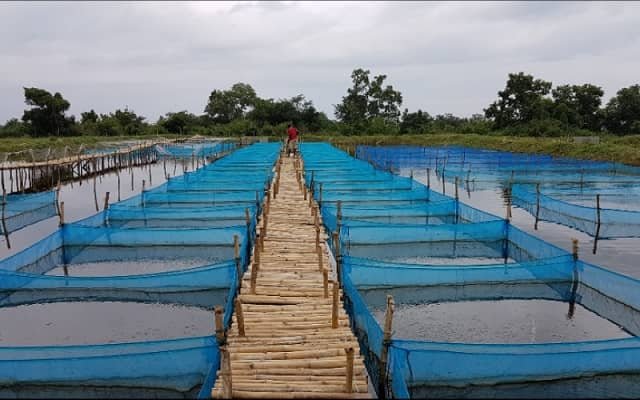As Integrated Multi-Trophic Aquaculture (IMTA) is a relatively new concept, a new online training course has been developed as part of the IMPAQT research project, which is co-ordinated by the Marine Institute. The free online course is available on the Open University’s OpenLearnCreate platform.
IMTA involves farming multiple, complementary species from different levels of the food chain together for their mutual benefit. The new massive open online course (MOOC) aims to facilitate the effective transfer of knowledge on IMTA, precision aquaculture, and the results of the IMPAQT project to interested stakeholders, policy actors and the aquaculture industry.
The EU’s Horizon 2020 IMPAQT project (Intelligent Management System for Integrated Multi-Trophic Aquaculture) aims to promote aquaculture production based on the IMTA concept.
Coordinated by the Marine Institute, the IMPAQT research project has developed a computerised, artificially intelligent, management platform, which analyses the environment, fish behaviour, and data from satellites and images, as well as inputs from the farmer on site. This platform provides information on fish welfare and water quality, and real-time operational feedback and advice to the farmer on the management of their site. The IMPAQT system has been designed and tested at the Marine Institute’s research site in Lehanagh Pool in Co Galway, the Keywater Fisheries IMTA site in Co Sligo, as well as four other aquaculture sites in Europe and China.
Frank Kane, Marine Institute and IMPAQT Coordinator said, “This new course presents the outputs and results from the IMPAQT project in an accessible, understandable and dynamic online format. The online training course will help to strengthen the research and innovative aquaculture landscape, by transferring the key aspects of IMTA to stakeholders, investors and enterprises interested in starting up or integrating an IMTA system.”
The new online course, IMPAQT MOOC, will be of interest to those working in the aquaculture sector (fish farmers, farm owners, regulators, policy makers), as well as those who support the sector (technology suppliers and developers, representative organisations, trainers and educators, regulators and policy makers), along with investors in the sector.
The IMPAQT MOOC can be completed in eight hours, and is divided into four modules which focus on the concept and practices of IMTA, the sustainability and socio-economic assessments of IMTA, and on sensors, monitoring and precision aquaculture in support of IMTA. It is possible to select individual elements from the course to complete. The course includes text and short videos presented by the IMPAQT project partners.
The course provides an introduction to aquaculture and the concept of IMTA, outlining the potential benefits and challenges. It details the IMTA experiences in the IMPAQT project and for extractive species such as seaweed, mussels, oysters, scallops and lobsters. IMTA in China and Turkey is also covered. The sustainability and circularity of IMTA are presented with reference to life cycle assessments, socio-economic analysis, ecosystem services and IMTA modelling. Aquaculture sensors and the technologies to facilitate monitoring and management, along with the intelligent management system developed are included in the Precision Aquaculture module, as are the analysis of fish quality and biofouling on sensors.
Stay Always Informed
Join our communities to instantly receive the most important news, reports, and analysis from the aquaculture industry.
For more information, or to enrol in the new IMPAQT MOOC visit https://www.open.edu/openlearncreate/course/view.php?id=7116
The IMPAQT project has received funding from the European Union’s Horizon 2020 research and innovation programme under grant agreement No 774109. For more information visit https://impaqtproject.eu/
Source: Marine Institute
Editor at the digital magazine AquaHoy. He holds a degree in Aquaculture Biology from the National University of Santa (UNS) and a Master’s degree in Science and Innovation Management from the Polytechnic University of Valencia, with postgraduate diplomas in Business Innovation and Innovation Management. He possesses extensive experience in the aquaculture and fisheries sector, having led the Fisheries Innovation Unit of the National Program for Innovation in Fisheries and Aquaculture (PNIPA). He has served as a senior consultant in technology watch, an innovation project formulator and advisor, and a lecturer at UNS. He is a member of the Peruvian College of Biologists and was recognized by the World Aquaculture Society (WAS) in 2016 for his contribution to aquaculture.







